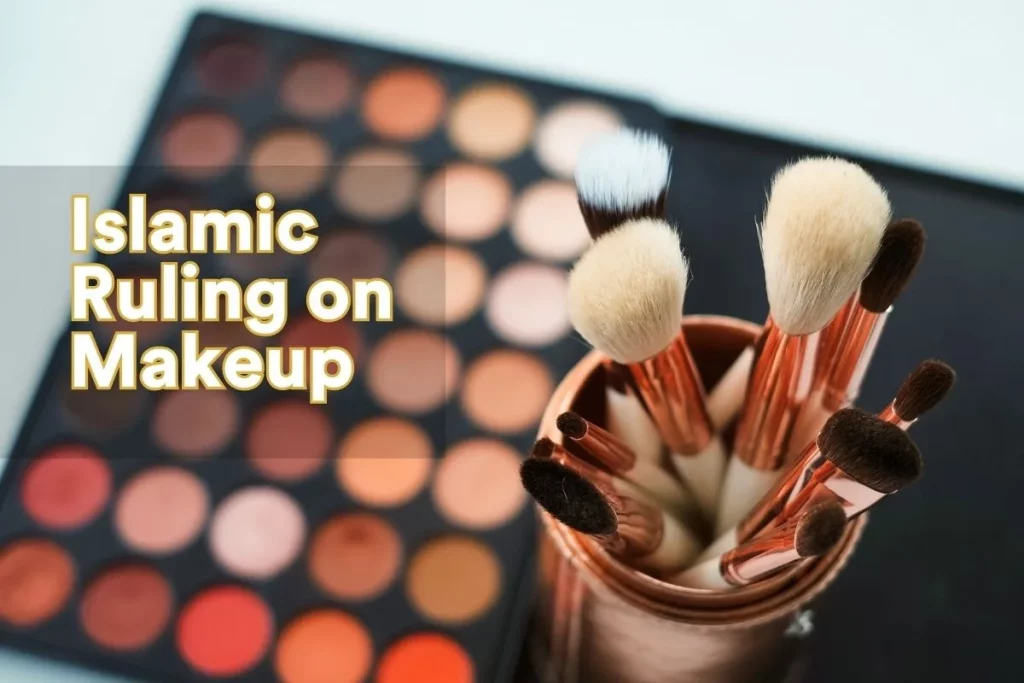Makeup has been a part of human culture for thousands of years. It has been used by both men and women for various reasons such as enhancing one’s appearance, expressing creativity, and even for religious purposes.
One question that seems to persist in the Muslim community is: “Is makeup haram?” This article delves deep to explore various perspectives and to answer this question. Let’s take a look further.
Key Takeaways
| 📌 Makeup in Islam: Makeup is generally allowed in Islam when used for maintaining cleanliness, enhancing one’s appearance as an act of worship, and pleasing one’s spouse. However, it should not interfere with religious obligations. |
| 📌 Halal Ingredients: It’s important to use makeup products with halal ingredients obtained through lawful means. Ingredients should not be harmful, and awareness of potentially harmful substances is crucial for responsible cosmetic choices. |
| 📌 Health Awareness: Being informed about the ingredients in makeup is essential, as some components can be harmful to health. Make informed choices that align with your principles and standards for a responsible approach to cosmetics. |
Different Types of Makeup
Makeup is a form of self-expression that has been used for centuries. There are various types of makeup that people use to enhance their beauty. Here are a few types of makeup that are commonly used:
Foundation and Concealers
- Foundation is a skin-colored makeup applied to the face to create an even, uniform complexion, cover flaws, and sometimes, change the natural skin tone. Foundations come in various forms, including liquid, powder, and cream.
- Concealers are used to mask dark circles, age spots, large pores, and other small blemishes visible on the skin. Concealers work effectively when applied before the foundation.
Mascara and Eyeliner
- Mascara is designed to enhance the eyelashes by darkening, thickening, and lengthening them to define the eyes more prominently.
- Eyeliner is used to define the eyes, helping to make them stand out by drawing a line around the contours of the eyes. They come in various formats, including pencils, gels, and liquids.
Fake Eyelashes and Lash Extensions
- Fake Eyelashes are artificial lashes designed to be glued onto the natural eyelashes to give a fuller and more dramatic look.
- A step beyond fake eyelashes, lash extensions involve adding synthetic, silk, or mink fibers to the natural lashes, providing a more prolonged effect compared to fake eyelashes.
Blush and Bronzers
- Blush is used to mimic a natural flush, giving a youthful and healthy glow to the face. It’s applied to the apples of the cheeks, often in pink or peach tones.
- Bronzers are used to emulate a sun-kissed glow and to define the face through contouring. They are generally a few shades darker than one’s natural skin tone.
Nail Polish and Fake Nails
- Nail Polish is a lacquer that can be applied to the human fingernails or toenails to decorate and protect the nail plates. Nail polish comes in every color imaginable, allowing for creativity and personalization in one’s look.
- Fake Nails are extensions placed over fingernails as fashion accessories. They are an option for people who struggle to grow long, strong nails.
Lipsticks and Glosses
- Lipsticks add color, texture, and protection to the lips, available in a wide range of colors and finishes, from matte to glossy.
- Lip glosses add a shiny and often slightly tinted hue, giving a fresh and moisturized look to the lips. They can be worn alone or over lipstick to add shine.
Each of these makeup types holds a special place in cosmetic routines, offering individuals the chance to enhance their natural beauty while possibly navigating the boundaries of what is permissible in Islam.
Ingredients in Makeup
Makeup products contain various ingredients that are used to create different textures, colors, and effects. Some of these ingredients may have an Islamic status that needs to be considered by Muslim consumers.
Understanding what these products are made of can provide insight into whether they align with one’s personal principles and standards. Below, we highlight some commonly used ingredients in makeup:
| Ingredients | Overview | Usage in Makeup |
|---|---|---|
| Talc | Hydrated magnesium silicate mineral is known for its ability to absorb moisture and reduce friction. | Fundamental in setting powders, foundation, and eyeshadows for its smooth texture and absorbent properties. |
| Mica | A group of sheet silicate minerals known for their shimmering properties. | Adds sparkle to products like eyeshadows, lipsticks, and blushes. |
| Titanium Dioxide | A naturally occurring mineral utilized for its whitening and UV protection properties. | Used in sunscreens, foundations, and loose powders for UV protection and to give products a creamy texture. |
| Iron Oxides | Chemical compounds of iron and oxygen are used to provide color in makeup products. | Serves as pigments in products like lipsticks and eyeshadows, providing a rich variety of hues. |
| Parabens | Synthetic chemicals are used as preservatives in cosmetics and personal care products. | Extends the shelf life of makeup products by preventing bacterial and mold growth. |
Knowing the intricacies of the ingredients used in makeup products can be a foundational step in making informed choices regarding their usage, catering to both aesthetic desires and ethical considerations.
Is Makeup Haram?

In Islam, it is acceptable for women to use makeup or cosmetics under the following stipulations:
1. The intention is to maintain beauty and cleanliness serves both as an act of worship and as a means to please her husband.
أَخْبَرَنَا قُتَيْبَةُ، قَالَ حَدَّثَنَا اللَّيْثُ، عَنِ ابْنِ عَجْلاَنَ، عَنْ سَعِيدٍ الْمَقْبُرِيِّ، عَنْ أَبِي هُرَيْرَةَ، قَالَ قِيلَ لِرَسُولِ اللَّهِ صلى الله عليه وسلم أَىُّ النِّسَاءِ خَيْرٌ قَالَ
“ الَّتِي تَسُرُّهُ إِذَا نَظَرَ وَتُطِيعُهُ إِذَا أَمَرَ وَلاَ تُخَالِفُهُ فِي نَفْسِهَا وَمَالِهَا بِمَا يَكْرَهُ .“
Narrated Abu Hurairah:
It was narrated that Abu Hurairah said: “It was said to the Messenger of Allah: ‘Which woman is best?’ He said: ‘The one who makes him happy when he looks at her, obeys him when he commands her, and she does not go against his wishes with regard to herself nor her wealth.'”
Sunan an-Nasa’i 3231
2. Utilizing materials that are considered halal and acquiring them through halal means.
عَنْ أَبِي هُرَيْرَةَ قَالَ قَالَ رَسُولُ اللَّهِ صَلَّى اللَّهُ عَلَيْهِ وَسَلَّمَ,
مَنْ جَمَعَ مَالًا حَرَامًا ثُمَّ تَصَدَّقَ بِهِ لَمْ يَكُنْ لَهُ فِيهِ أَجْرٌ وَكَانَ إِصْرُهُ عَلَيْهِ
Abu Huraira reported:
The Messenger of Allah, peace and blessings be upon him, said, “Whoever accumulates unlawful wealth and then gives it in charity, he will never be rewarded and the burden of sin will be upon him.”
Sahih Ibn Hibban 3367
3. The use of makeup should not interfere with one’s religious duties or obligations. If wearing makeup causes one to miss prayer or other religious obligations, then it would be considered haram.
As an illustration, a growing trend in cosmetics is the use of waterproof products, such as lipstick, powder, or similar items, designed to resist fading easily.
In the context of Muslim women performing ablution, it’s observed that some may display laziness or reluctance in removing their cosmetics beforehand. In more extreme cases, there are individuals who intentionally skip prayers due to their unwillingness to remove makeup from their faces.
4. It should neither pose potential harm nor entail the use of hazardous materials. In other words, makeup should be safe for both the individual using it and the environment in which it is applied.
وَأَنفِقُوا۟ فِى سَبِيلِ ٱللَّهِ وَلَا تُلْقُوا۟ بِأَيْدِيكُمْ إِلَى ٱلتَّهْلُكَةِ ۛ وَأَحْسِنُوٓا۟ ۛ إِنَّ ٱللَّهَ يُحِبُّ ٱلْمُحْسِنِينَ
Spend in the cause of Allah and do not let your own hands throw you into destruction ˹by withholding˺. And do good, for Allah certainly loves the good-doers.
Al Baqarah 2:195
List of Harmful Ingredients in Makeup
Some ingredients, although commonly used, can have adverse effects on your health. Below is a list of known harmful ingredients found in some makeup and personal care products:
| Ingredient | Description |
|---|---|
| Formaldehyde and formaldehyde-releasing preservatives | These substances are known to be carcinogenic, meaning they can cause cancer. Additionally, they can irritate and sensitize the skin, leading to allergic reactions and other skin issues. They are used in many cosmetic products to prevent bacteria growth. |
| Mercury | Mercury is a nephrotoxic and neurotoxic element, which means it can damage the kidneys and the nervous system respectively. It is used in some skin-lightening creams and can be found in other cosmetics as well. Prolonged exposure can lead to mercury poisoning. |
| Phthalates (Dibutyl and Diethylhexyl) | Phthalates are endocrine disruptors, which means they can interfere with hormone functioning and damage the reproductive system. They are often used to increase the flexibility and softness of plastics in cosmetics. They can also be harmful to the developing fetus. |
| Parabens (Isobutyl and Isopropyl) | Parabens are widely used preservatives in cosmetics and personal care products. They are known to be endocrine disruptors, potentially interfering with hormone functioning and harming the reproductive system. They can also cause skin irritation in some individuals. |
| PFAS (Per- and Polyfluoroalkyl Substances) | PFAS are a group of man-made chemicals that have been linked to cancer. They are used in a range of products for their water- and grease-resistant properties. Long-term exposure to these substances can have adverse effects on human health. |
| M- and O-Phenylenediamine (used in hair dyes) | These chemicals are used in hair dyes and are known to be irritants and genotoxic, meaning they can damage DNA and potentially cause cancer. They can irritate and sensitize the skin, leading to allergic reactions and other skin issues. It is advised to use them with caution. |
| Ethanolamine Compounds (found in shampoos and conditioners) | These compounds are used in shampoos and conditioners and can irritate the skin and eyes. They are used to create a creamy texture and to balance the pH of cosmetic products. However, they can cause allergic reactions and dryness in some individuals. |
| UV Filters (found in sunscreens and other products) | UV filters are used in sunscreens and other products to protect the skin from UV rays. However, they can be endocrine disruptors, interfering with hormone functioning. Some UV filters have been associated with environmental harm, as they can damage coral reefs. |
Conclusion
In the context of Islam, the permissibility of makeup hinges on several factors. It is allowed when the intention is to maintain cleanliness and enhance one’s appearance as an act of worship and to please one’s spouse.
Moreover, the use of halal ingredients obtained through lawful means is crucial. However, makeup should never interfere with one’s religious obligations, and it should not pose any potential harm, using non-hazardous materials.
An informed understanding of the ingredients in makeup is also essential, as some substances can be harmful to health. Being aware of potentially harmful ingredients and striving to make choices that align with one’s principles and standards ensures a responsible approach to using cosmetics.
Allahu A’lam (Allah Knows Best)
Frequently Asked Questions
Is wearing makeup permissible in Islam?
Certainly, Muslim women are permitted to apply makeup in a modest manner when in the presence of their husbands and mahrams (close relatives with whom marriage is prohibited), provided that the makeup is not harmful and does not disrupt their religious obligations.
What are the guidelines for wearing makeup in public as a Muslim?
The Islamic principles are modesty and humility. Muslim women should avoid wearing makeup that is too bold or attention-grabbing. It is also important to ensure that the makeup does not clash with the hijab or other modest clothing.
Are there any specific makeup products that are considered haram in Islam?
There are some makeup products that are considered haram in Islam, such as those that contain ingredients derived from animals that were not slaughtered according to Islamic guidelines. It is also haram to use makeup that contains intoxicating substances. Muslim women should be mindful of the ingredients in their makeup and avoid products that are not halal.
- Is Pop Tarts Halal? What You Need to Know - February 18, 2024
- Are Graham Crackers Halal in Islam? - January 19, 2024
- Is Keebler Wheatables Halal? - January 18, 2024





